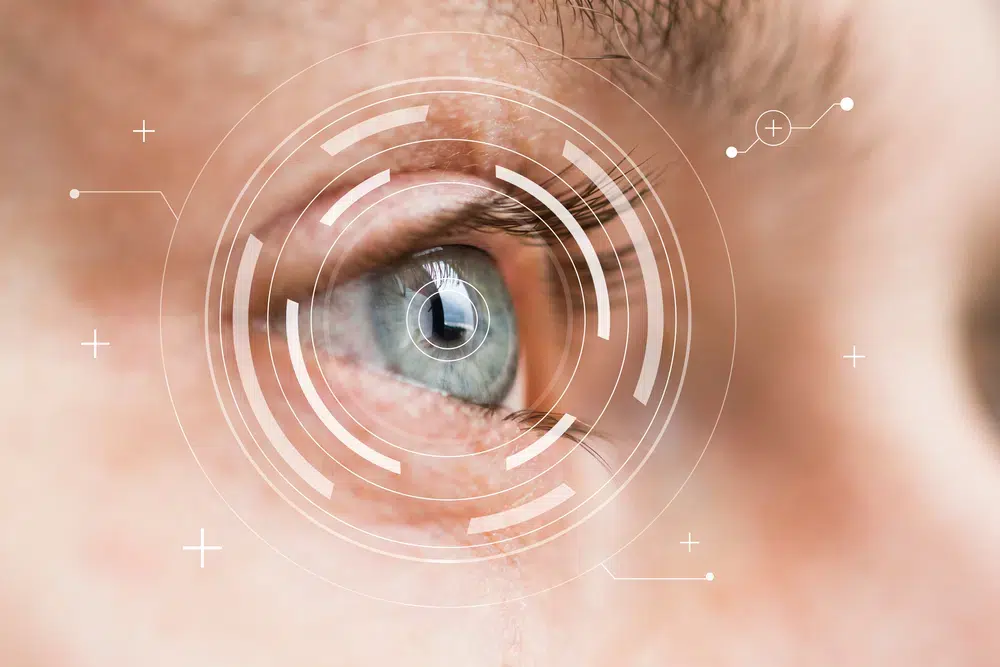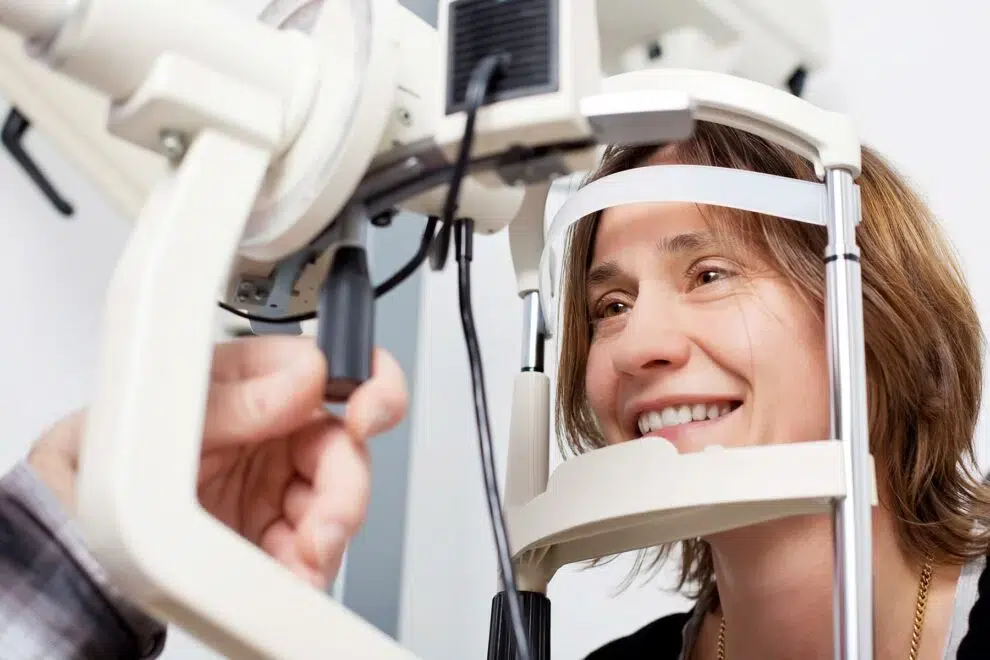Cornea
Key Points About Cornea Treatment at North Georgia Eye Associates
- Our cornea specialists provide comprehensive cornea care for patients in Gainesville, Braselton, Cumming, and surrounding North Georgia communities.
- The cornea specialists at North Georgia Eye Associates diagnose and treat a wide range of corneal conditions, including keratoconus, corneal dystrophies, infections, and injuries.
- Personalized treatment plans range from medical management to advanced surgical options based on each patient’s vision needs.
- Advanced corneal procedures offered include pterygium removal, laser vision correction, and partial-thickness corneal transplants such as DMEK and DSAEK.
- Patients will receive expert cornea care from board-certified ophthalmologists at multiple convenient locations across North Georgia.

What Is the Cornea?
The cornea is the transparent, curved tissue that covers the iris, pupil, and anterior chamber at the front of your eye. This sophisticated structure performs two essential functions: protecting your eye from environmental threats and focusing light onto the retina for clear vision.
As the eye’s outermost surface, the cornea is a critical barrier against germs, ultraviolet radiation, and foreign debris. Additionally, its shape determines how effectively light enters your eye, directly impacting visual clarity.
Irregularities in corneal shape commonly result in refractive errors such as nearsightedness, farsightedness, and astigmatism. The cornea achieves its functionality through a complex six-layer structure, consisting of the epithelium, Bowman’s layer, the stroma, Pre-Descemet’s layer, Descemet’s membrane, and the endothelium.
Each layer uniquely contributes to the cornea’s dual role of protection and vision, working harmoniously to deliver optimal visual performance.
Common Cornea Conditions
The cornea can develop various disorders that significantly impact vision quality and eye comfort. Early diagnosis and specialized treatment are essential for preserving sight and preventing progression.
Our corneal specialists, Dr. Dholakia, Dr. Shah, and Dr. Kaufman, excel in managing a full spectrum of corneal conditions, including:
Keratoconus
Keratoconus predominantly affects younger patients and involves progressive thinning of the cornea, causing it to bulge outward into a cone-like shape. This structural change typically results in distorted vision, heightened light sensitivity, double vision, irregular astigmatism, and nearsightedness.
North Georgia Eye Associates offers advanced diagnostic technology to detect keratoconus in its earliest stages when treatment can be most effective.
Dry Eye Syndrome
If you are experiencing dry eye syndrome and your tears do not lubricate the cornea’s epithelium enough, it can prevent your eyes from absorbing oxygen properly. Dry eye symptoms are irritating, often consisting of a stinging sensation, blurred vision, light sensitivity, mucus in or around the eyes, and overproduction of tears.
Dr. Kaufman, Dr. Dholakia, and Dr. Shah all treat the condition at North Georgia Eye Associates’ Dry Eye Center of Excellence. Dry Eye is a primary focus of Dr. Shah’s practice, as she is dedicated to helping patients find relief from this common condition through advanced, effective treatments.
Refractive Errors
Refractive errors like nearsightedness, farsightedness, and astigmatism can occur when the eye is too short or too long, or the cornea is misshapen. They can cause blurry vision and require patients to use visual aids like glasses and contacts to achieve clear vision.
Corneal Dystrophies
These genetically determined progressive conditions affect corneal shape and clarity, leading to various vision disturbances. Fuchs’ dystrophy is the most prevalent form, characterized by endothelial cell deterioration that disrupts proper fluid regulation within the cornea.
Fuchs’ dystrophy typically manifests with symptoms including blurred vision, painful blisters, corneal scarring, photosensitivity, and compromised night vision. Women demonstrate higher susceptibility than men, with initial symptoms commonly emerging between the ages of 30 and 40.
Other common corneal dystrophies include lattice corneal dystrophy, granular corneal dystrophy, and epithelial basement membrane dystrophy.
Keratitis
Keratitis frequently results from infection and produces symptoms including redness, pain, excessive tearing, vision disturbances, and sensitivity to light.
Corneal Injuries and Ulcers
Trauma to the cornea, including abrasions and scars, can cause significant discomfort and visual impairment. Without proper treatment, severe damage may lead to corneal ulcers, which are open sores on the cornea that require immediate medical attention.
Left untreated, corneal ulcers can result in clouding, perforation, or substantial vision loss. Other common cornea diseases and disorders include:
- Allergic reactions
- Bullous keratopathy
- Conjunctivitis
- Glaucoma-related corneal changes
- Ocular herpes
- Pterygium
- Shingles (Herpes Zoster)
- Stevens-Johnson Syndrome
Treatment for Corneal Conditions

North Georgia Eye Associates delivers personalized treatment plans based on your specific diagnosis, condition severity, and individual needs. Our corneal specialists utilizes both minimally invasive approaches like medications, visual aids, and eye drops, as well as advanced surgical techniques to restore corneal health and visual function.
Dry Eye Treatments
At our Dry Eye Center of Excellence, North Georgia Eye Associates offers cutting-edge treatments like cryopreserved amniotic membranes, autologous serum tears, intense pulsed light (IPL), and LipiFlow. For more information on our Dry Eye Treatments, please visit our Dry Eye page.
Laser Vision Correction
Laser vision correction procedures like LASIK and PRK, performed by Dr. Kaufman, can offer patients with nearsightedness, farsightedness, and astigmatism freedom from visual aids and crisper, clearer vision.
Pterygium Removal
This outpatient procedure eliminates noncancerous growth of blood vessels and scar tissue (pterygium) that can distort vision and cause chronic irritation. Dr. Dholakia, Dr. Kaufman, and Dr. Shah perform pterygium removal using advanced techniques that improve both visual quality and comfort.
Lamellar Keratectomy
Lamellar keratectomy is a sophisticated corneal smoothing procedure that involves carefully removing scar tissue, such as Salzmann’s Nodules, from the cornea’s surface. Patients typically experience improved vision and greater comfort following this quick, in-office procedure.
Superficial Keratectomy
Superficial keratectomy addresses anterior basement membrane dystrophy (ABMD), which can cause both blurred vision and recurrent painful episodes. Dr. Dholakia, Dr. Shah, and Dr. Kaufman perform this precise in-office procedure to smooth the corneal surface, effectively addressing both visual disturbances and discomfort.
EDTA Chelation
EDTA chelation is a specialized chemical treatment that removes calcium deposits from the cornea and is particularly effective for band keratopathy. The procedure applies ethylenediaminetetraacetic acid (EDTA) solution to dissolve these deposits, enhancing vision clarity and alleviating discomfort associated with calcium buildup.
Ocular Surface Reconstruction
For patients with severe corneal and conjunctival damage from injuries, burns, or conditions like Stevens-Johnson syndrome, ocular cicatricial pemphigoid, or limbal stem cell deficiency, advanced reconstructive procedures may help restore ocular surface integrity and function.
Corneal Transplantation
While most corneal conditions respond to less invasive treatments, some cases require transplantation procedures. Dr. Dholakia at North Georgia Eye Associates specializes in advanced, partial-thickness transplant techniques that preserve healthy corneal tissue while replacing only damaged layers:
DMEK (Descemet Membrane Endothelial Keratoplasty)
DMEK specifically addresses endothelial damage by replacing only the innermost corneal layer with donor tissue. This procedure offers faster visual recovery and reduced rejection risk compared to traditional full-thickness transplants.
DSAEK (Descemet Stripping Endothelial Keratoplasty)
For patients with damage affecting both the endothelium and stroma, DSAEK provides a slightly thicker transplant than DMEK while still maintaining the advantages of partial-thickness procedures.
The cornea’s vital role in both protecting your eye and enabling clear vision makes specialized care essential for corneal conditions. Our comprehensive approach emphasizes early detection, personalized treatment plans, and minimally invasive techniques whenever possible to preserve your vision and eye health.
If you’re experiencing symptoms of a corneal condition or require specialized corneal care, schedule an appointment at North Georgia Eye Associates today to explore your treatment options.





